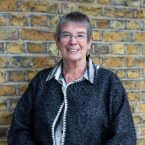The European Federation of Nurses Associations (EFN) represents 36 national nurses’ associations (NNAs) and promotes the independent voice of the nursing profession within the European Union. The RCN was a founding member, and Patricia Marquis, RCN England Director, was elected as Vice President of EFN in January 2024.
I was delighted to join Patricia, Wendy Preston, Head of Nursing (Workforce), and Anna Argyrides, International Policy Manager, to make up the delegation from the RCN at the most recent EFN General Assembly (GA) in Brussels.
Several NNAs within EFN are not part of the EU, but, like the RCN, recognise the benefits of being part of this European federation. Those benefits became clear to me over the 2 days of the GA. It was also clear how much the presence and contributions of the RCN are valued.
It is not perhaps surprising that nurses across Europe share the same interconnected challenges. The overarching theme throughout the meeting was the impact of the nursing workforce crisis. We know that there is a worldwide shortage of registered (or professional) nurses, and it was good to see Howard Catton, CEO of the International Council of Nurses (ICN) at the assembly, to remind us of the global impact this has.
The call for ‘safe staffing’ resonated throughout the assembly. The EFN, like the RCN is moving to define more clearly just what is meant by ‘safe staffing’, and, like the RCN, is moving towards the position of advocating for Nurse: Patient ratios. Nursing pay, terms and conditions vary across the continent, but they lie at the heart of the shared challenges of recruitment and retention seen in all participating countries.
Not only do the NNAs share the same challenges, but we recognise the same solutions. Primarily this is through investment in the nursing workforce, salaries that recognise the value and contribution of nursing. Access to continuing professional education, and a career structure that recognises and rewards the work of the registered nurse across health systems. Investment is needed to focus on increasing the domestic supply of the workforce through strengthening graduate nursing education.
By contrast the solutions being pursued by many governments and policy makers across the continent do not support the required level of investment in the profession, and instead we see an over-reliance on international recruitment from often fragile and vulnerable health systems. Whilst supporting freedom of movement, it was generally recognised that the significant increase in international recruitment in high income countries including the United Kingdom, at a time of a global shortage of nurses is unethical in the impact it is having in many countries across the globe. At the same time, those internationally recruited nurses are often exploited, meet with racism, or at the very least, do not have their skills and experienced adequately recognised in the destination country.
At the same time, many countries are seeing that nursing shortages are being addressed through substitution, with the introduction of new roles which seek to replace graduate registered or professional nurses with roles with the potential to weaken the profession – as is the case in Belgium with the introduction of a ‘basic nurse’. This is currently being challenged in the courts by the Belgian nursing association.
These discussions highlighted the importance of strengthening and supporting nursing leadership at the highest level nationally, and internationally, to amplify the voice of nursing in health policy.
I was able to join a meeting of the ‘Professional Committee’ of EFN, where I contributed to the review of a position statement on the need to invest in, and strengthen, nursing education. Following on from this was work on the safe ‘introduction’ (or induction) of the newly graduated nurse.
The committee was joined in its deliberations by our very own Wendy Preston, who is leading one of the EFN’s key workstreams, which is on Advanced Practice. This is an opportunity for the RCN to both learn from others, and support countries and nursing associations who are at an earlier stage in development. Wendy chairs a working group which has established a ‘Roadmap’ to a common position on Advanced Practice, including country-level principles on education, practice, regulation, and legislation.
The final session was a so-called ‘Tour de Table’ – an opportunity for each NNA to highlight pertinent issues from their perspective. The themes that came out of this session resonated with us all.
There was a recognition that to secure nursing salaries and careers that reflect the roles and responsibilities of nursing today, we need to address the public perception of nursing. Several countries are engaged in media campaigns to highlight the value of nursing; the public in Spain are being urged to ‘Ask your Nurse’.
To strengthen ‘domestic supply’ of nursing, investment in nursing education is essential. In Ireland and Spain, national nursing associations have worked with government to secure an increase in university places. This must be followed by investment in early career nurses, and examples of good practice were shared which have had a positive impact on both recruitment and retention. This included mandatory induction, and opportunities to gain further experience, including rotation between hospital and community settings positive for recruitment and retention. The need for supportive workplaces, and positive practice environments were recognised as essential along the career pathway, along with access to opportunities to continue to learn and grow as a professional.
This was a brilliant opportunity to come together with our peers on the European stage. It was great to see the respect in which the RCN is held, and the impact we have as a college, through our representatives in this federation.


 Share on LinkedIn
Share on LinkedIn




